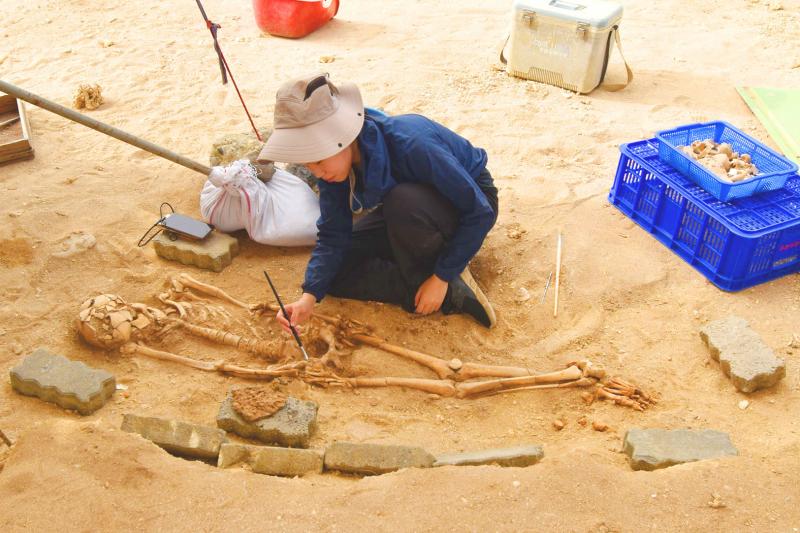Archeologists at National Tsing Hua University have uncovered the oldest and largest production area for shell tools found in the Pacific, providing early evidence of interaction between Austronesians in Taiwan and overseas.
The burial site on Oluanpi (鵝鑾鼻), Taiwan’s southernmost tip, contains a trove of artifacts dating back 3,800 to 4,200 years, said university associate professor of anthropology Chiu Hung-lin (邱鴻霖), who is leading the excavation with fellow anthropology professor Li Kuang-ti (李匡悌).
The site was discovered in 2017 during renovations of a building by the Kenting National Park Administration.

Photo: Courtesy of National Tsing Hua University
Between 2019 and last year, Chiu and Li excavated the site, finding sarcophagi, shell mounds, ash pits and a large number of other artifacts.
Fifty-one sets of human remains were uncovered, 10 of which were buried with stone slabs or coral burial artifacts, providing valuable insight into the burial practices, culture and physiognomy of Taiwan’s early residents, Chiu said.
ROBUST CAPABILITIES
They also found a large number of shell tools in many stages of completion, as well as the byproducts of their production, showing that the prehistoric people of Oluanpi had robust shell toolmaking capabilities, the university said.
Considering the similarities between the tools and others found across the Pacific, the finding proves early interaction between the peoples in Taiwan and overseas, having significant implications for Austronesian studies, Chiu said.
This is the first time such a large number of shell tools has been found in Taiwan, he added.
The artifacts are worth protecting, but the needs of local residents must also be considered, Chiu said, calling on the authorities to find a balance between preservation and development, while also finding a way to keep and display the artifacts near where they were found.

Taiwan is stepping up plans to create self-sufficient supply chains for combat drones and increase foreign orders from the US to counter China’s numerical superiority, a defense official said on Saturday. Commenting on condition of anonymity, the official said the nation’s armed forces are in agreement with US Admiral Samuel Paparo’s assessment that Taiwan’s military must be prepared to turn the nation’s waters into a “hellscape” for the Chinese People’s Liberation Army (PLA). Paparo, the commander of the US Indo-Pacific Command, reiterated the concept during a Congressional hearing in Washington on Wednesday. He first coined the term in a security conference last

A magnitude 4.3 earthquake struck eastern Taiwan's Hualien County at 8:31am today, according to the Central Weather Administration (CWA). The epicenter of the temblor was located in Hualien County, about 70.3 kilometers south southwest of Hualien County Hall, at a depth of 23.2km, according to the administration. There were no immediate reports of damage resulting from the quake. The earthquake's intensity, which gauges the actual effect of a temblor, was highest in Taitung County, where it measured 3 on Taiwan's 7-tier intensity scale. The quake also measured an intensity of 2 in Hualien and Nantou counties, the CWA said.

The Overseas Community Affairs Council (OCAC) yesterday announced a fundraising campaign to support survivors of the magnitude 7.7 earthquake that struck Myanmar on March 28, with two prayer events scheduled in Taipei and Taichung later this week. “While initial rescue operations have concluded [in Myanmar], many survivors are now facing increasingly difficult living conditions,” OCAC Minister Hsu Chia-ching (徐佳青) told a news conference in Taipei. The fundraising campaign, which runs through May 31, is focused on supporting the reconstruction of damaged overseas compatriot schools, assisting students from Myanmar in Taiwan, and providing essential items, such as drinking water, food and medical supplies,

New Party Deputy Secretary-General You Chih-pin (游智彬) this morning went to the National Immigration Agency (NIA) to “turn himself in” after being notified that he had failed to provide proof of having renounced his Chinese household registration. He was one of more than 10,000 naturalized Taiwanese citizens from China who were informed by the NIA that their Taiwanese citizenship might be revoked if they fail to provide the proof in three months, people familiar with the matter said. You said he has proof that he had renounced his Chinese household registration and demanded the NIA provide proof that he still had Chinese